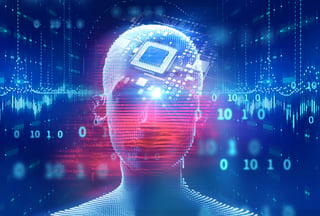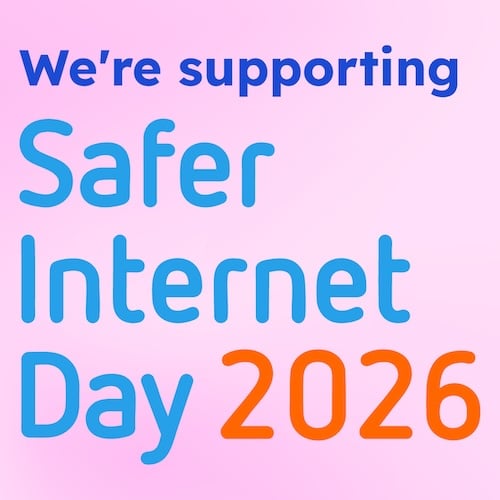By Ejona Preci, CISSP
The rapid advancement of Artificial Intelligence (AI) has sparked a global discussion on its potential impact and implications for humanity. From transforming jobs and established workplace processes, to redefining the role of people in work and society, the emergence of AI has raised thought-provoking questions about our future: What does singularity mean? Will we be able to keep the balance between utopia and dystopia? What are the potential consequences for jobs and what is the role of humans in shaping AI's impact on our way of life? How can we parse the truth in the times of AI-powered Deepfakes?

Understanding Singularity
The concept of singularity refers to a hypothetical point in the future when AI surpasses human intelligence, potentially leading to significant changes in society. As we explore the possibilities and potential risks associated with advanced AI systems, we must strive to ensure that AI machines will have our best interests in mind. Collaborative efforts are needed to establish ethical frameworks and safeguards to navigate the path towards a "human friendly" singularity.
AI-Powered Deepfakes
The risk of AI-powered Deepfakes is alarming in today's world. With the help of AI, sophisticated algorithms can create manipulated content that is almost indistinguishable from genuine recordings. Deepfakes allow for the impersonation of people (faces and voices) in convincingly realistic videos, which can have potentially serious consequences for individuals' privacy, reputation, and safety. In the U.S., there have been reported cases where hackers used AI voice trainers to create false scenarios of children being kidnapped, along with demanding ransom payments from parents. Furthermore, so-called "fake news" generated through AI poses a threat to society, as it can promote and present misinformation that can appear genuine, leading to political manipulation and societal division. It is crucial that we are aware of these risks and develop mechanisms to verify the authenticity of content and mitigate the spread of harmful fabrications.
Utopia vs. Dystopia: Striking the Balance
There are thoughts floating around which suggest that future impact of AI lies somewhere between utopia and dystopia. It is crucial to approach AI development with a balance between optimism and caution, addressing potential pitfalls while harnessing its transformative potential for the greater good. Responsible and ethical implementation and ongoing monitoring can help mitigate negative impacts and foster a more equitable society.
Humanity's Relationship with AI
The way humans use AI plays a significant role in shaping its impact. As AI progresses, it is anticipated that every profession will have an AI co-pilot. But until when? Until machines surpass human capabilities? There is an urgent call for humans to retain their role as decision-makers, ensuring that AI remains a tool that amplifies our abilities and augments our purpose rather than diminishing them. As long as AI machines cannot be held accountable, they should not be granted the authority to make decisions.
The Promise of Abundance and Human Ego
Would it be too naive if we think that AI may create abundance for humanity? This idea is very compelling but at the same time extremely challenging. While AI has the potential to alleviate real-world problems, human ego and self-interests can hinder the progress. Overcoming these obstacles requires collective efforts and a shift in mindset. By recognizing the immense potential of AI to address pressing global challenges, we should align our goals and actions towards a future where abundance is shared, and the benefits of AI are widely accessible.
The Journey Ahead
As we navigate the complex landscape of AI, it is crucial to acknowledge both the possibilities and risks it presents. The responsibility falls upon us to shape the development and application of AI in a way that aligns with our values and ensures the preservation of human interests. By actively engaging in dialogue, collaborating across disciplines, and implementing robust ethical frameworks, we can harness the power of AI to tackle the world's most significant challenges and create a future that benefits humanity.
The world is rife with real problems. By embracing a collective vision and addressing challenges with research and dialogue, we can steer the course of AI towards a future of abundance for humanity. It is an exciting time, but it is also a time of great uncertainty. We need to be thoughtful about the choices we make, and make sure that we are teaching AI that humans are predominantly driven by positive qualities such as love, compassion, and empathy, despite the negativity that exists in the world. We are tasked with being the finest custodians and guides for AI and this will define our future.
Ejona Preçi, CISSP, CISM, CRISC, ITIL v.4, is a seasoned cybersecurity professional. She is an accomplished mentor, author, and keynote speaker, as well as a podcaster. Ejona is a passionate advocate for women in cybersecurity and has been recognised as one of the 44 Cyber Power Women and shortlisted for Cybersecurity Woman of the Year Award 2023. With over 12 years of experience in IT and Cybersecurity, she brings a wealth of expertise to the field.


